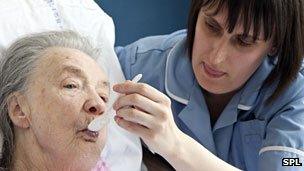RCN: NHS healthcare assistants' training 'unacceptable'
- Published

Healthcare assistants are employed to do basic tasks like feeding and washing patients
The NHS is too reliant on untrained healthcare assistants who are asked to pick up nursing skills as they go along, says the head of the Royal College of Nursing.
Peter Carter said healthcare assistants were employed to help nurses with basic tasks like washing and feeding, but ended up doing much more.
They should be subject to regulation and mandatory training, Dr Carter said.
He also warned that some nursing degree courses focus too much on theory.
Dr Carter said healthcare assistants were essential to the NHS and wanted to do a good job, but they needed to be properly trained.
"Many hospitals employ healthcare assistants as opposed to registered nurses, and many of them don't give them as much as an hour's training.
"This happens in some care homes and domiciliary care too.
"It is wholly unacceptable that the elderly should be cared for by people who are not given the rudimentary training."
He said spending on regulation and proper training would prove a wise investment.
"Cheap care is poor care. Poor care ends up being more expensive. We must invest properly in the workforce and then we will get fewer problems and complications."
He said he was not trying to alarm patients by questioning the training given to healthcare workers.
"There are plenty of examples where healthcare assistants are properly trained, but there are huge variations in training across the board.
"People are given a tunic which looks like a nurse's uniform and they are asked to pick it up as they go along. I can't think of any other sector where that would be acceptable."
"It wouldn't happen with tyre fitters or at John Lewis or Marks and Spencer... but it is seen to be acceptable in some of our healthcare settings in the NHS."
Hands-on training
Dr Peter Carter, the Royal College of Nursing's chief executive: 'healthcare assistants are asked to pick it up as they go along'
Dr Carter added: "Mobilising people, catheterising people, dealing with nutrition and hygiene - these are techniques that should be taught properly. This would have avoided many of the problems we've been reading about in recent months."
A spokeswoman from the Department of Health said the government was not in favour of national statutory regulation for healthcare assistants.
"The government's view is that national statutory regulation must be proportionate and targeted - and we do not believe that this is the case for healthcare assistants.
"The government intends to establish the Professional Standards Authority for Health and Social Care (currently the CHRE) as the national accrediting body for a system of assured voluntary registers for groups that are currently not subject to statutory professional regulation, which includes healthcare assistants."
Dr Carter was also critical of the amount of money spent on the new IT system for the NHS, calling it a "national disgrace".
"Eleven billion pounds is a huge amount of money. If more of that had been spent on the workforce instead, lots of problems with standards of care in some hospitals would have been avoided."
Dr Carter went on to say that some institutions running nursing degree courses were not providing students with the necessary balance between classroom learning and hands-on training.
"While the vast majority of student nurses are well trained, there are a few cases where this training is not of the level it should be.
"It is vital that we do not see a variation in standards across the country, for whatever reason; be it inadequate courses or cutbacks on wards which prevent staff from teaching students as they'd wish."
He added: "Universities and NHS Trusts have a responsibility to their students and future patients to ensure that training fully equips nurses for the demands of this complex and skilled profession."
The Royal College of Nursing has long been supportive of the move to ensure all new nurses have a degree by 2013.
The Nursing and Midwifery Council, which vets university training courses, said: "The balance between theory and practice in these courses hasn't changed. It's 50-50 and it has been that way for many years."
- Published10 April 2011
- Published15 February 2011